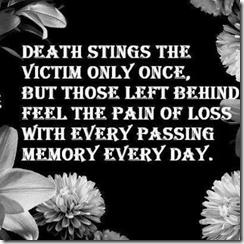Susan Cain is right about most things, but she is wrong about death
/Author Susan Cain posted this in response to her reading from the Book of Ecclesiastes:
I don’t know why everyone talks about the fear of death. I love life, but I don’t fear death. What I fear is the deaths of the people I love best — because I fear the pain of having to live without them. And I fear my own death only insofar as it would cause my loved ones this same terrible pain.
She also posted this image:
Longtime readers of this blog will not be surprised to hear that I do not agree with Susan. It is often said that death is hardest on those left behind, but I disagree. I have always felt that death is hardest on the dead.
Consider my mother.
Mom died in 2007 at the age of 57. Not a day goes by that I don’t think about her and miss her terribly. The loss of a mother represents an inexorable disconnection to your past and a fundamental shift in a your position in the universe that can only be understood by those who have suffered this terrible loss.
It is a tragic thing to lose one’s mother. One of the most tragic things.
Since my mother’s death, I have become the father of two children and a published author. The fact that my mother will never meet my children, nor will she ever read one of my books, breaks my heart again and again. It breaks my heart everyday. Two of the most important aspects of my life will never be known by my mother. It saddens me beyond measure.
But who has it worse? Me or my mother?
It’s not even close. I would argue that my mother has it worse by a hundred fold. A thousand fold. My mother has only been dead for six years, but the number of moments that she has already missed is astounding.
I play with my children every day. I kiss them and hug them and laugh with them constantly. I live alongside a woman who I love and who loves me in return. I reap the daily and oftentimes surprising rewards of a published author. I play golf and poker with my friends and take the stage to tell stories and listen to music and read new books and teach my students about Shakespeare and triangles and eat Egg McMuffins and ice cream.
I am saddened almost daily by the loss of my mother. Her loss stings me again and again and again. There are times when it makes life hard. But my mother will never hear the laugh of a child ever again. She will never read another book or listen to another song or eat another cone of ice cream. She will never know what her children or grandchildren have become, nor will she feel the sweetness of their kisses or the warmth of their embraces. My mother suffers losses on an almost minute-by-minute basis. The world moves on. Wonders never cease. Beauty is created and destroyed. She misses it all. Every second of every day.
The mounting losses that my mother suffers are immeasurable. The idea that she has been stung by death just once is ludicrous. Simply because she is not here to complain about her losses or even experience them firsthand does not make them any less tragic.
I wish the idea that death is hardest on the living would go away. I find this sentiment shortsighted at best. It represents the idea that the continued unraveling of time is irrelevant and meaningless to anyone no longer here. It allows the living to focus solely on the here and the now and leave those who have died firmly in the past. It permits the grieving to encapsulate and codify a life in its moment of existence and never imagine what could or should have been. It affords us the opportunity to erase all lost and possible futures for our deceased loved ones. It’s a focus on the self and the present that I find narcissistic and a little cruel.
Yes, the loss of a loved one is hard. It is incredibly hard. But the absence of a loved one and the cessation of their existence does not mean that their losses are any less terrible.
Death is hardest on the dead, because the living move on. The grieving have friend and family, books and music, ice cream and Egg McMuffins to comfort them. They remain a part of the story. They get to see what comes next. Opportunity and hope remain integral parts of their lives.
I miss my mother every day. Her loss makes life harder. More bitter. Less joyous. But she has it far worse. Do not pity the living, because we still possess life, the most precious of all commodities.
Pity the dead for all that they have have lost and will continue to lose forever more.
